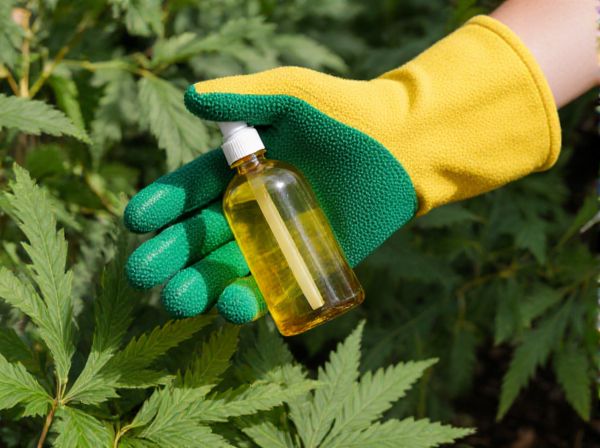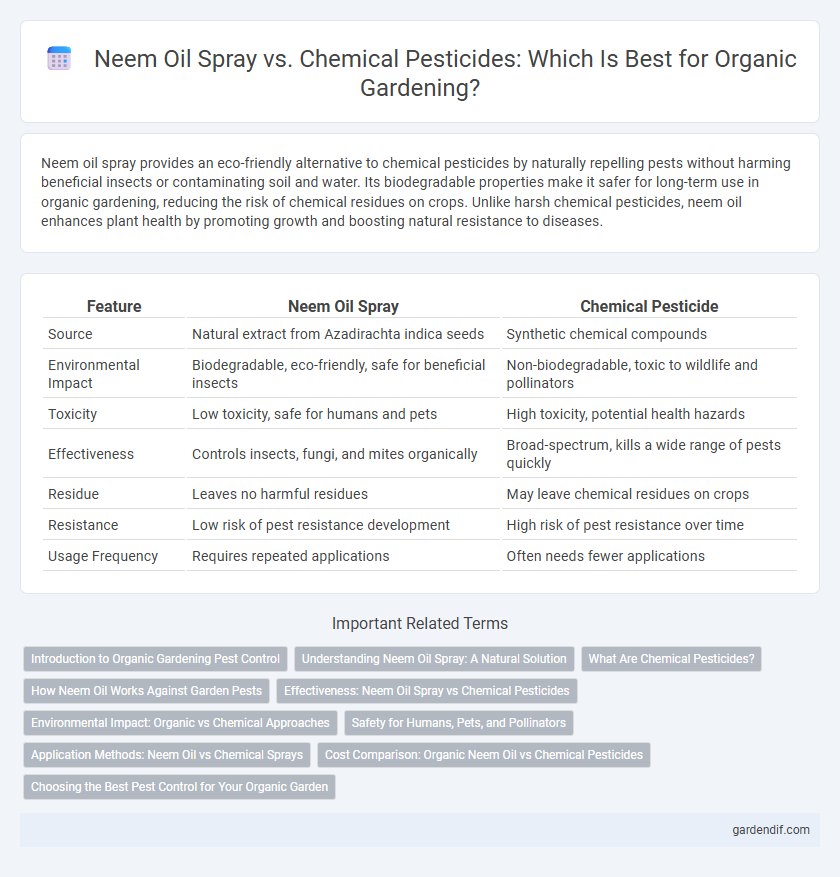
Neem Oil Spray vs Chemical Pesticide Illustration
Neem oil spray provides an eco-friendly alternative to chemical pesticides by naturally repelling pests without harming beneficial insects or contaminating soil and water. Its biodegradable properties make it safer for long-term use in organic gardening, reducing the risk of chemical residues on crops. Unlike harsh chemical pesticides, neem oil enhances plant health by promoting growth and boosting natural resistance to diseases.
Table of Comparison
| Feature | Neem Oil Spray | Chemical Pesticide |
|---|---|---|
| Source | Natural extract from Azadirachta indica seeds | Synthetic chemical compounds |
| Environmental Impact | Biodegradable, eco-friendly, safe for beneficial insects | Non-biodegradable, toxic to wildlife and pollinators |
| Toxicity | Low toxicity, safe for humans and pets | High toxicity, potential health hazards |
| Effectiveness | Controls insects, fungi, and mites organically | Broad-spectrum, kills a wide range of pests quickly |
| Residue | Leaves no harmful residues | May leave chemical residues on crops |
| Resistance | Low risk of pest resistance development | High risk of pest resistance over time |
| Usage Frequency | Requires repeated applications | Often needs fewer applications |
Introduction to Organic Gardening Pest Control
Neem oil spray offers a natural, eco-friendly solution for pest control by disrupting insect growth and repelling harmful pests without harming beneficial insects or soil health. Chemical pesticides often provide immediate pest elimination but can cause long-term environmental damage, including soil degradation and water contamination. Organic gardening prioritizes sustainable pest management methods like neem oil to promote biodiversity and maintain ecosystem balance.
Understanding Neem Oil Spray: A Natural Solution
Neem oil spray delivers a natural, eco-friendly alternative to chemical pesticides by harnessing azadirachtin, a bioactive compound that disrupts insect growth and feeding. Its biodegradable properties reduce environmental impact and minimize harm to beneficial insects, supporting sustainable agriculture. Neem oil's multifunctional pest control makes it an ideal choice for organic farming and integrated pest management systems.
What Are Chemical Pesticides?
Chemical pesticides are synthetic substances designed to eliminate or control pests, such as insects, weeds, and fungi, in agricultural and garden settings. These compounds often contain toxic ingredients that can persist in the environment, potentially causing harm to beneficial organisms, soil health, and water quality. Unlike organic alternatives like neem oil spray, chemical pesticides may contribute to pesticide resistance and environmental pollution.
How Neem Oil Works Against Garden Pests
Neem oil spray disrupts the life cycle of garden pests by acting as an antifeedant, repellent, and growth regulator due to its active compound azadirachtin. It interferes with the hormonal system of insects, preventing molting, reproduction, and feeding behavior, which leads to pest population reduction. Unlike chemical pesticides, neem oil targets pests selectively, minimizing harm to beneficial insects and promoting organic garden health.
Effectiveness: Neem Oil Spray vs Chemical Pesticides
Neem oil spray effectively controls a broad range of pests by disrupting their life cycles and acts as a natural insect repellent without harmful residues. Chemical pesticides often provide faster knockdown of target pests but can lead to resistance, environmental contamination, and harm to non-target species. Research indicates neem oil spray contributes to sustainable pest management by enhancing soil health and reducing chemical buildup in ecosystems.
Environmental Impact: Organic vs Chemical Approaches
Neem oil spray offers an environmentally friendly alternative to chemical pesticides by breaking down quickly in soil and posing minimal risk to non-target organisms, including beneficial insects like pollinators. Chemical pesticides often persist in the environment, contaminating soil and water, leading to biodiversity loss and disrupting ecosystems. Using neem oil supports sustainable agriculture by reducing harmful residues and promoting soil health.
Safety for Humans, Pets, and Pollinators
Neem oil spray offers a safer alternative to chemical pesticides, exhibiting low toxicity for humans, pets, and beneficial pollinators such as bees and butterflies. Its natural properties reduce the risk of harmful residues and environmental contamination, promoting a healthier ecosystem. In contrast, chemical pesticides often pose significant health risks, including acute poisoning and long-term exposure effects on non-target organisms.
Application Methods: Neem Oil vs Chemical Sprays
Neem oil spray is applied as a foliar spray or soil drench, targeting pests while preserving beneficial insects and enhancing plant health through its natural bioactive compounds. Chemical pesticides are typically applied using sprayers that deliver synthetic chemicals designed for rapid pest elimination but often harm non-target organisms and contribute to environmental pollution. The controlled, residue-free application of neem oil contrasts with the broader ecological impact and potential toxicity associated with chemical pesticide sprays.
Cost Comparison: Organic Neem Oil vs Chemical Pesticides
Neem oil spray typically costs more upfront than chemical pesticides due to its organic extraction process and natural formulation. While chemical pesticides may offer lower initial prices, the long-term expenses often increase due to environmental damage, resistance buildup, and health risks. Investing in neem oil spray supports sustainable pest control with cost benefits arising from reduced health hazards and improved soil health.
Choosing the Best Pest Control for Your Organic Garden
Neem oil spray offers a natural, eco-friendly solution that effectively targets a broad spectrum of garden pests without harming beneficial insects or soil health. Chemical pesticides, while potent, often leave harmful residues and disrupt the organic ecosystem critical for sustainable gardening. Opting for neem oil ensures pest control aligns with organic principles, promoting plant vitality and safe, chemical-free harvests.
Neem Oil Spray vs Chemical Pesticide Infographic

 gardendif.com
gardendif.com